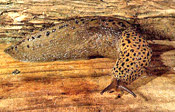Controlling slugs with coffee
by Trudy Bialic, Editor
This article was originally published in March 2005

(March 2005) — Nature magazine is reporting a new, safer method to control slugs and snails in the garden — coffee. Researchers have found that slugs and snails just hate caffeine, so this offers a safer alternative to poisons; controlling slugs with coffee.
A team from the U.S. Department of Agriculture Research Service in Hawaii were testing caffeine sprays to control a non-native species of frog when they noticed even a weak solution killed most of the slugs and snails. Concentrations as low as 1 to 2 percent kept the garden mollusks away from the plants that they would normally target for lunch. Diluting brewed coffee with an equal part water is plenty to do the job.
Coffee grounds have been recommended in the past as an organic method to keep slugs and snails out of your flower and vegetable beds. Grounds will repel slugs, but the USDA research team confirms that a caffeine solution is more effective. Slugs reportedly will turn back immediately when coming into contact with caffeinated soil.
Caffeine is reported to be even more effective than metaldehyde products such as Cory’s Slug and Snail Death, Deadline, and Slug-Tox. Metaldehyde is a poison that’s blended with a sweet-smelling base attractive to slugs and snails, available in granules, sprays, dusts and pellets.
It’s classified by the U. S. Environmental Protection Agency as a “slightly toxic compound that may be fatal to dogs or other pets if eaten.” But according to the “Field Guide to the Slug” (Sasquatch Books), ingesting metaldehyde can cause damage to the nervous system or death in animals and humans. The threshold for toxicity is related to size, making birds, small animals and young children most vulnerable.
Other commercial slug and snail baits are based on iron phosphate, which is a compound that occurs naturally in the soil. They’re typically sold as pellets under the brand names Sluggo and Escar-go! When slugs or snails eat these pellets, they stop eating. Manufacturers of iron phosphate products say they’re nontoxic around children and animals.
Oh, and if someone tells you to sprinkle salt on your garden slugs, don’t. Salt makes the soil toxic for all but a very few salt-tolerant plants. Go for the caffeine instead.
